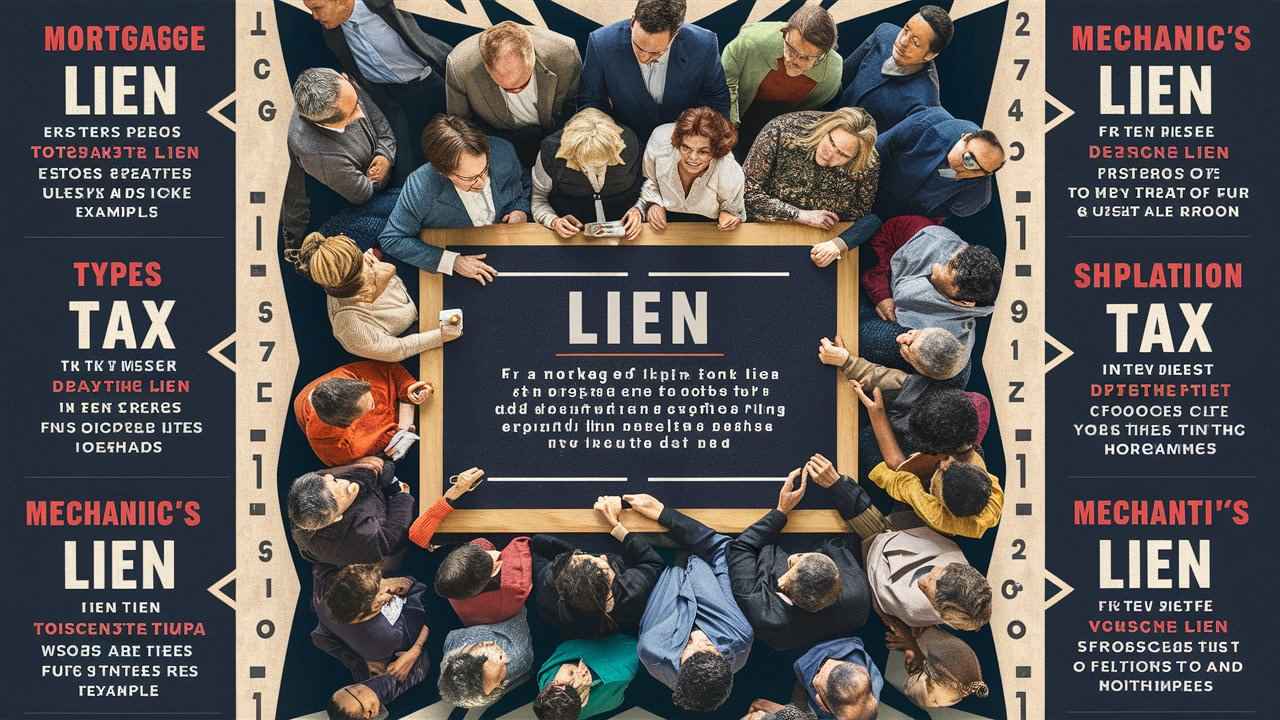What on Earth is a Lien?
A lien is like that annoying friend who just won’t leave your party until you pay them back for the pizza. Except in this case, the pizza is your house, your car, or maybe even your paycheck. A lien is a legal claim that someone (a creditor) has on your property because you owe them money. It’s their way of saying, “Sure, you can keep using that thing, but don’t get too comfortable💰it’s mine until you settle up!” In short, it’s a way for creditors to protect themselves from financial loss.

Why Should You Care About Liens?
Why should you care? Because a lien can flip your financial world upside down faster than you can say “repossession.” If you’re trying to sell your house, a lien could stop the sale cold. If you’re trying to get a loan, a lien could send your credit score into the abyss. Even worse, if you ignore it long enough, you could lose your property entirely. Liens aren’t just a minor inconvenience💰they’re the kind of legal landmines you need to know about before they blow up in your face.
Taking in the Basics of a Lien
Lien Definition: Let’s Break It Down
In simple terms, a lien is a legal right or claim against a property by a creditor. The property serves as collateral until the debt is paid off. But here’s where it gets tricky: liens aren’t attached to you; they’re attached to your stuff. This means even if you sell the property, the lien can stick around, haunting the next owner like a legal ghost. The debt doesn’t just disappear because you’ve moved on.
The Legal Mumbo Jumbo Behind a Lien
Behind the scenes, a lien is rooted in centuries-old legal concepts that give creditors security. It’s not just a casual IOU; it’s a formal, enforceable right. Liens can be consensual, meaning you agreed to them (think: mortgage), or they can be non-consensual, where they’re slapped on your property without your say (hello, tax lien!). And they’re not limited to physical property💰wages and bank accounts can be liened, too.
Who Can Place a Lien, and Why?
Liens can be placed by a variety of people, from banks and lending institutions to your friendly neighborhood contractor. The IRS can also get in on the action when you forget to pay your taxes. Essentially, anyone you owe money to can, in theory, place a lien on your property. Their end game? To ensure that if you don’t pay up, they still have a way to collect what’s owed.
The Importance of Knowing About Liens
How Liens Can Impact Your Life (And Your Stuff)
A lien isn’t just a piece of paper💰it’s a looming threat that can disrupt your life in profound ways. Want to sell your house? Not until that lien is resolved. Want to refinance? Good luck with that. Liens can tank your credit score and make you look like a risky bet to lenders. In extreme cases, you could be forced to sell your property or have it taken away through foreclosure. In short, liens can throw a wrench into your financial plans, making them one of the most frustrating legal claims to deal with.
Protecting Your Property: Why Lien Knowledge Matters
Being aware of liens is the first step in protecting your property. Whether you’re buying a home or taking out a loan, understanding how liens work helps you avoid surprises. For example, if you’re purchasing a property, you’ll want to check for any pre-existing liens that could suddenly become your problem. Knowing the basics can save you from making a costly mistake or losing assets you thought were secure.

The Meaning Behind a Lien
What Exactly is a Lien Claiming?
At its core, a lien is claiming ownership interest in your property. It doesn’t mean the creditor physically possesses your stuff (yet), but it does mean they have a legal right to it if you fail to pay your debt. The creditor can, in some cases, force a sale of the property to recover what’s owed, effectively stripping you of your ownership rights until the debt is satisfied. It’s like a big, flashing sign saying, “Hands off! This belongs to someone else, for now.”💰
The Hidden Power of Liens Over Your Assets
Liens are subtle but powerful tools that can tie your hands when it comes to your assets. Even if you’re up to date on your mortgage, if there’s an outstanding lien on your home, you can’t sell it or refinance without addressing the lien first. Creditors essentially get the first dibs on your property, even if it’s the last thing on your mind. They may not come knocking on your door today, but trust💰they’ll be there when you try to make a move with that asset.
Can You Really Lose Your Property Over a Lien?
In a word: yes. If the lien remains unresolved, creditors can initiate foreclosure proceedings or force the sale of your property. It’s not just a scare tactic; it’s a legal reality. Whether it’s your home, car, or wages, creditors will come after what’s theirs, and a lien gives them the power to do it. So, unless you like living on the edge, paying off liens should be high on your to-do list.

Types of Liens: Let’s Get Specific
The Two Main Categories of Liens: Voluntary vs. Involuntary
Liens come in two main varieties: voluntary and involuntary. A voluntary lien is one you knowingly agree to, like a mortgage or car loan. An involuntary lien, on the other hand, is imposed without your consent💰think tax liens or judgment liens. These involuntary liens are often the most painful because they can sneak up on you when you least expect it.
Voluntary Liens: When You Actually Agree to This!
Voluntary liens are straightforward: you borrow money and agree to let the lender place a lien on your property as security. Mortgages are the most common example. When you buy a house, you agree that the lender can take it if you stop making payments. It’s a deal you enter into willingly💰no surprises here, just the usual “pay up or hand over the keys” scenario.
Involuntary Liens: The Sneaky Kind You Didn’t Ask For
Involuntary liens are the ones that pop up like a bad penny. You don’t ask for them, but they find you anyway. Tax liens, mechanic’s liens, and judgment liens are all examples. These typically happen when you owe money but didn’t cough it up on time. And unlike voluntary liens, these can feel like legal ambushes, showing up at the worst possible time.
Common Types of Liens: The Big Players in the Lien Game
Some liens are more common than others. Mortgage liens are the bread and butter of voluntary liens, while tax liens, mechanic’s liens, and judgment liens dominate the involuntary space. Tax liens happen when you owe Uncle Sam. Mechanic’s liens are placed by contractors who haven’t been paid for work on your property. Judgment liens are the result of losing a lawsuit and not paying up. These big players can cause major headaches if they catch you off guard.

Examples of Liens You May (or May Not) Encounter
The Mortgage Lien: Owning a Home, Kind Of
A mortgage lien is probably the most familiar lien to most people. It’s what allows banks to foreclose on homes when the homeowner defaults on their loan. You may own your home in theory, but until that mortgage is paid off, the bank holds a big chunk of your property rights.
The Tax Lien: When Uncle Sam Wants a Cut
Tax liens are the government’s way of saying, “You didn’t pay your taxes, so we’re taking your stuff.” If you owe back taxes, the IRS can place a lien on your property, meaning they can seize your assets or force you to sell to pay your debt. It’s a surefire way to get people to take their taxes seriously.
The Mechanic’s Lien: When Your Contractor Isn’t Happy
Mechanic’s liens are the contractor’s trump card. If you hire someone to work on your property and don’t pay them, they can place a lien on your home. This lien means they can force the sale of the property to get what they’re owed💰definitely motivation to settle that bill.
The Judgment Lien: When You Lose in Court
Judgment liens arise when you lose a lawsuit and the court orders you to pay damages. If you don’t pay up, the winning party can place a lien on your property as collateral. It’s the court’s way of ensuring that you can’t just walk away from your legal obligations.
The HOA Lien: Even Your Neighborhood Has Teeth
Homeowner associations can place liens, too. If you fall behind on HOA fees, they can place a lien on your home, making it impossible to sell or refinance until the debt is paid. In extreme cases, the HOA can even foreclose on your home. Turns out your neighborhood has more power than you thought.💰

How Liens Are Filed
The Lien Process: How It All Starts
The lien process typically starts when a creditor files a claim with the local court or government office. For a lien to be valid, it has to be officially recorded. Once filed, it attaches to your property like a legal barnacle, and removing it can be a complicated, time-consuming process.
What Happens After a Lien is Filed?
Once a lien is filed, the clock starts ticking. You have a limited amount of time to pay off the debt or face the consequences. If you don’t settle the lien, creditors can move forward with legal action, including foreclosure, wage garnishment, or forced sale of the property.💰
How to Get Rid of a Lien
Can You Escape a Lien? Spoiler: Yes, But It’s Tricky
Getting rid of a lien isn’t impossible, but it can be tricky. The easiest way to remove a lien is by paying off the debt. However, you may also be able to negotiate a settlement or challenge the lien in court. Each method requires navigating a web of legal procedures, so it’s not a simple “one-click” solution.
The Lien Release: Waving Goodbye to Liens
Once the debt is paid, the lienholder is required to file a lien release. This document officially removes the lien from your property, giving you full ownership once again. But here’s the catch: it’s up to you to ensure that the release is properly filed, or the lien might still show up on property records.💰
The Lien Waiver: A Pre-Emptive Strike
A lien waiver is a document that ensures no lien will be placed on your property in the first place. Contractors and suppliers often provide lien waivers after they’ve been paid, protecting property owners from future claims. It’s a proactive move that can save a lot of headaches down the line.

What Happens if You Ignore a Lien?
The Scary Consequences of Letting Liens Linger
Ignoring a lien is like ignoring a time bomb💰it’s going to blow up eventually. Liens can lead to foreclosure, forced sale, wage garnishment, or other serious legal actions. The longer you let it sit, the harder it is to resolve, and the more damage it can do to your financial standing.
Can You Really Lose Everything?
In extreme cases, yes. If a lien goes unpaid and the creditor takes legal action, you can lose your property, your assets, and even your income. Ignoring a lien is the fast track to losing everything you’ve worked hard for.
Conclusion
Wrapping Up Liens: What You Need to Know
Liens may seem like minor legal nuisances, but they have the potential to wreak havoc on your financial life. Knowing what liens are, how they’re filed, and how to get rid of them is essential for protecting your property and your peace of mind.
Liens: The Legal Cloud That Can Rain on Your Parade
Think of a lien as a legal cloud hanging over your property💰until it’s resolved, you’re not in the clear. Whether you’re dealing with a mortgage, tax debt, or a contractor dispute, addressing liens promptly is the best way to avoid a financial storm.
Final Thoughts
Stay Lien-Free: Tips to Avoid Legal Troubles
The best way to avoid liens? Stay on top of your payments, keep an eye on your property records, and make sure you’re not unknowingly taking on someone else’s debt. A little proactive financial management goes a long way in keeping your assets lien-free.
People Also Ask
What does it mean to take a lien?
To take a lien means to legally claim an interest in someone’s property until a debt or obligation is fulfilled. It’s essentially a creditor’s way of ensuring they get paid, as they can take legal action to seize or sell the property if the debt remains unpaid.
What is a lien in a bank account?
A lien in a bank account is when a financial institution places a hold on the funds within the account due to an outstanding debt. The account holder cannot access these funds until the lien is resolved, usually by paying off the debt.
Why is it called a lien?
The term lien comes from the Latin word “ligare,” which means “to bind.” It represents a legal binding or claim that restricts the owner’s ability to use or transfer the property freely until obligations are met.
What is lien known for?
A lien is known for providing legal leverage to creditors, allowing them to claim property or assets to satisfy an unpaid debt. It’s a powerful legal tool in the collection of debts.
Does lien mean finance?
Yes, a lien is commonly associated with finance. It refers to a legal claim against property or assets used as collateral for a debt. While it originates in legal terms, it is closely tied to financial obligations.
What is lien charge?
A lien charge is the legal claim placed on an asset or property by a creditor as security for a debt. It gives the creditor the right to take or sell the property if the debt is not paid.
What is the synonym of lien?
Synonyms for lien include claim, encumbrance, charge, or security interest. All these terms relate to legal rights over property until a debt is satisfied.
What is general lien?
A general lien is a creditor’s right to retain possession of any and all property of the debtor until the debt owed is paid. It applies to all assets owned by the debtor, not just specific property.
Is lien amount refundable?
A lien amount is not refundable, but once the debt or obligation associated with the lien is satisfied, the lien is released, and access to the funds or property is restored to the debtor.
Where does lien work?
Liens can work on real estate, personal property, bank accounts, wages, and vehicles. They are often used in contexts like mortgages, taxes, and unpaid bills for goods or services.
What does the name lien mean?
The name “Lien,” when used as a personal name, has different origins and meanings depending on culture. In Dutch, it is a diminutive form of names like Caroline. In Vietnamese, it means “lotus flower,” symbolizing purity and elegance.
What is a particular lien?
A particular lien is a claim that only applies to specific property or assets, rather than a debtor’s entire estate. For example, a mechanic’s lien is a particular lien on a car until the repair bill is paid.
What is called lien?
A lien is called a legal right or claim that a creditor has over a debtor’s property. It ensures the creditor can secure repayment or compensation through the property if the debtor defaults.
What is the difference between a pledge and a lien?
A pledge is when a debtor voluntarily hands over property to a creditor as security for a debt, while a lien allows the creditor to claim or seize the property without the debtor’s voluntary handover.
What is general lien in banking?
In banking, a general lien gives the bank the right to retain any and all funds or assets a customer holds with them until any outstanding obligations are settled.
What is the meaning of lean account?
A “lean” account typically refers to a bank account that has a lien placed on it, meaning the funds are restricted or frozen due to an outstanding debt or obligation.
How long can a bank legally freeze your account?
The length of time a bank can legally freeze an account depends on the reason for the freeze. For liens or garnishments, the freeze can last until the debt is paid or the lien is lifted by legal authorities.
What is a lien in a bank?
A lien in a bank is a legal claim on the account holder’s funds, often placed due to a debt or legal obligation. The funds cannot be accessed by the account holder until the lien is satisfied.









